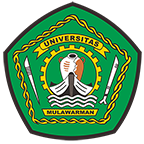ESG: Criteria 2.1

2.1 - Policy for Quality Assurance
UNMUL implements a robust and structured Internal Quality Assurance System (SPMI) to ensure the continuous improvement of academic and non-academic functions, in alignment with national regulations and global higher education standards. The SPMI framework is integrated at institutional, faculty, and program levels, including the Magister Pendidikan Bahasa Inggris (MPBI) program, and serves as the foundation for program evaluation, curriculum enhancement, and accreditation readiness.
1. Quality Assurance Policy
The SPMI at UNMUL follows the five-stage PPEPP cycle—Penetapan (Establishment), Pelaksanaan (Implementation), Evaluasi (Evaluation), Pengendalian (Control), and Peningkatan (Improvement)—as mandated by Law No. 12 of 2012 on Higher Education and further elaborated in Ministerial Regulation No. 53 of 2023. This cycle is applied consistently across all academic units, ensuring that quality standards are not only set but also operationalized, monitored, and refined based on evidence and performance outcomes.
Internally, UNMUL implements its SPMI based on the university’s strategic objectives and the National Standards for Higher Education (SN-Dikti). It operates alongside external quality assurance mechanisms (SPME), such as accreditation through BAN-PT and discipline-specific LAMs (e.g., LAM Kependidikan for Education). This alignment is clearly documented in the UNMUL Quality Assurance Handbook (Annex 1), which outlines institutional responsibilities, quality standards, and evaluation mechanisms.
The SPMI system also directly supports compliance with Key Performance Indicator (IKU) No. 8, which targets the increase of internationally accredited programs. As part of this initiative, the university has introduced structured preparation pathways for international accreditation, including with agencies such as ASIIN, ACQUIN, ABET, and AACSB, allowing academic units like MPBI to benchmark against international criteria while enhancing academic reputation.
Moreover, UNMUL recognizes best practices in SPMI implementation across faculties and study programs, particularly in teaching, student affairs, research, and community engagement. These recognitions are based on clear documentation, data integration, and evidence of impact. Evaluation of these practices is embedded in routine quality audits and reflected in yearly internal quality reports (Annex 1).
2. Legal Framework for SPMI
The legal foundation for UNMUL’s SPMI is firmly grounded in national legislation and institutional policies. The principal references include:
Law No. 12 of 2012 on Higher Education, which defines the responsibilities of universities in ensuring internal academic quality.
Ministerial Regulation No. 3 of 2020 and Ministerial Regulation No. 53 of 2023, which guide the technical implementation of SPMI.
Government Regulation No. 4 of 2014, which outlines the governance of higher education and its quality assurance.
UNMUL Rector’s Regulations, which translate national policy into institutional academic procedures.
These frameworks guide academic policies, curriculum development, the Merdeka Belajar Kampus Merdeka (MBKM) initiative, and institutional autonomy. They ensure that all quality processes—from teaching delivery to outcome measurement—are regulated and compliant with current legal standards. The institutional application of these regulations is described in Annex 1 – Quality Assurance Handbook.
3. Implementation of SPMI
The implementation of SPMI at UNMUL is anchored in the PDCA (Plan-Do-Check-Act) model, which mirrors the PPEPP approach and is applied at every academic level. The cycle begins with strategic planning at both university and faculty levels. The UNMUL Strategic Plan 2020–2024 outlines measurable indicators for quality assurance, including performance thresholds, graduate learning outcomes, and teaching effectiveness metrics. Faculties, including the Faculty of Cultural Sciences, where MPBI is housed, are required to align their plans with institutional goals.
Each academic unit develops a Policy Plan covering key quality domains: curriculum, assessment, lecturer development, pedagogy, student services, and infrastructure. These plans are reviewed and updated every four years. The scope and structure of these policy plans are aligned with the Module Evaluation Guidelines (Annex 2), which guide study programs in evaluating course effectiveness and ensuring alignment with SN-Dikti and international standards.
The implementation phase (DO) is evidenced in teaching organization structures, such as workload scheduling, examination protocols, and standardized evaluations. These are supported by data from SIAKAD (Academic Information System) and LMS platforms. Curriculum implementation integrates research and international perspectives, consistent with MPBI’s postgraduate-level expectations.
4. Evaluation of SPMI Implementation
The Internal Quality Audit (AMI) is the main instrument for evaluating SPMI implementation at UNMUL. Conducted biannually (each semester and annually), the AMI process evaluates program compliance, lecturer performance, teaching evaluations, and curriculum delivery. These audits assess the quality of SAR documents, performance indicators, and the Lecturer Teaching Index (IKD). The five-level quality control hierarchy ensures that SPMI implementation is observed from the university level (Level 1) down to the course and lecturer level (Level 5).
Level 1: QA management at university level
Level 2: QA coordination at faculty level
Level 3: Study program oversight
Level 4: Course cluster (RMK) monitoring
Level 5: Lecturer-level performance
The responsibilities of each level are codified in Rector’s Decree No. 9457 of 2023, ensuring clarity in authority and accountability. The Study Program Management Unit (UPPS) oversees compliance within study programs like MPBI, ensuring curriculum, teaching, and resource standards are met. Reporting and evaluation within Levels 3–5 are particularly crucial for ensuring bottom-up feedback and program-level continuous improvement. These mechanisms are supported by standardized tools detailed in the Quality Assurance Handbook (Annex 1) and specific course and module evaluations detailed in Annex 2.
The findings from the AMI are used to develop action plans at the program, faculty, and institutional levels. These plans address emerging gaps, revise ineffective policies, and promote best practices across academic units. The PDCA cycle is thus completed through systematic implementation of quality enhancements.
Supporting Evidence:
Annex 1 – Quality Assurance Handbook
Annex 2 – Module Evaluation Guidelines
Rector’s Decree No. 9457 of 2023 (integrated within Annex 1)
